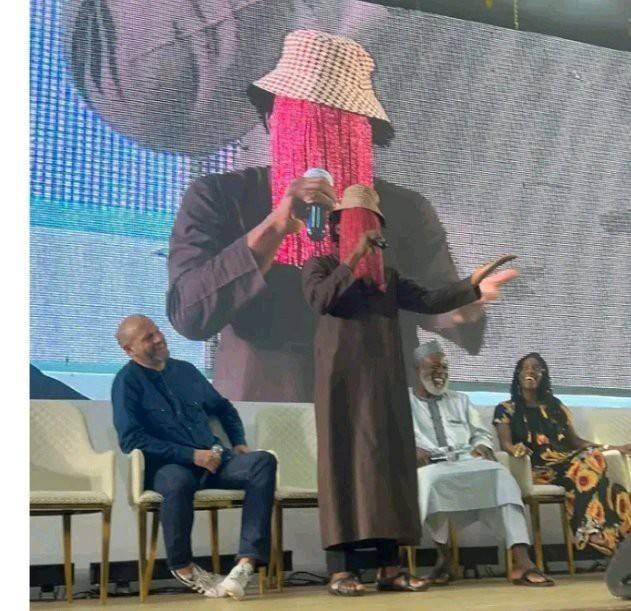In a groundbreaking announcement, acclaimed Ghanaian investigative journalist Anas Aremeyaw Anas is preparing to release damning evidence of high-level corruption involving some of Ghana’s most influential political figures. This anticipated exposé promises to unveil hidden facets of public figures, shedding light on the widespread corruption affecting the political and public service landscape in Ghana. The revelations, which include covertly captured footage of illicit activities, are expected to shake Ghana's political circles to their core, with implications that could have far-reaching consequences.
Anas, known globally for his unique style of investigative journalism under the motto “name, shame, and jail,†has consistently tackled corruption through daring undercover investigations. His latest announcement, made in a BBC Africa interview, reveals that his team’s investigation uncovered shocking evidence of unethical and unlawful practices at the highest levels of government and public service. This forthcoming exposé, according to Anas, is among his most critical investigations to date.
For years, Anas has led a team of investigative journalists who go undercover to expose corruption and abuse of power, often at great personal risk. His investigations typically feature hidden camera footage, captured through elaborate setups that require patience, extensive planning, and high-level security measures. In this latest case, the evidence reportedly shows powerful officials engaging in corrupt dealings that could erode public trust and compromise Ghana’s political integrity.
While the exact content of the footage remains confidential, Anas hinted at the disturbing nature of what was captured. Speaking to BBC Africa, he described the footage as “unbearably abhorrent,†even as someone accustomed to confronting corruption. “I’ve seen many things in my line of work, but this one shocked me,†Anas admitted. “The level of betrayal and self-interest displayed here is beyond anything I could have imagined. I felt disturbed watching the footage, knowing the extent of the damage such corruption inflicts on ordinary Ghanaians.â€
Sources familiar with Anas’s investigation suggest the footage implicates high-ranking government officials, including several who hold positions of considerable influence. The video reportedly features scenes that expose bribe-taking, abuse of power, and misappropriation of public funds—actions that betray the trust of the very citizens these officials are supposed to serve. Anas’s team has documented every stage of their investigation, ensuring that the evidence gathered will withstand scrutiny and clearly illustrate the extent of wrongdoing.
The anticipated impact of the exposé has already stirred public discussion and debate. Political analysts are speculating that these revelations could lead to significant shifts in Ghana’s political landscape. If the allegations prove accurate, those implicated may face intense scrutiny, both legally and publicly, as calls for accountability grow louder. Civil society groups and anti-corruption advocates have expressed hope that the exposé will lead to meaningful action, including criminal investigations and reforms aimed at curbing corruption in the public sector. Anas himself voiced his hope that this investigation would spark a broader conversation on corruption in Ghana. “Ghanaians deserve to know the truth about those entrusted with power,†he stated. “We must confront the reality of corruption if we are ever to create a transparent and accountable society.â€
The release of Anas’s findings has generated immense anticipation across the country, with citizens eagerly awaiting the full disclosure of the investigation. Ghanaians have long admired Anas for his courage and relentless pursuit of justice, and many expect this latest exposé to have a significant impact on the country’s political discourse. The public’s trust in institutions has been shaken by past revelations of corruption, and Anas’s upcoming release may further erode confidence in the current administration and its officials.
Anas’s investigative work has been a powerful force for change in Ghana, leading to resignations, prosecutions, and broader awareness of corruption’s corrosive effects on society. His team’s previous investigations have uncovered corruption in the judiciary, public service, and even among religious leaders. Anas’s fearless approach has earned him both respect and criticism, with some viewing his methods as controversial. However, his commitment to exposing corruption remains unwavering, and he has repeatedly stated that he believes the end justifies the means when it comes to holding the powerful accountable.
As the country waits for Anas’s latest exposé, there is widespread speculation about the possible fallout. Some political observers predict that the revelations could prompt resignations and trigger legal actions against those implicated. There is also hope that this investigation will spark a renewed commitment to anti-corruption reforms within the government. However, others worry that political maneuvering might overshadow the issue, with implicated officials potentially using their influence to undermine or discredit the findings.
Despite these uncertainties, Anas remains resolute in his mission to expose the truth. “Our job as journalists is not to sugarcoat the facts,†he stated. “The people deserve to know what is happening, no matter how uncomfortable or shocking the truth may be. We cannot remain silent while those in power betray our trust and act with impunity. Transparency and accountability are essential to building a better Ghana.â€
The significance of this exposé extends beyond Ghana’s borders, as it highlights the ongoing struggle against corruption across Africa. Anas’s work has inspired journalists throughout the continent to pursue similar investigations, often at great personal risk. His bravery underscores the role of the press in holding leaders accountable, especially in countries where public institutions often lack transparency and integrity. In a region where freedom of the press is frequently challenged, Anas’s determination serves as a reminder of the media’s essential role in fostering accountability and justice.
As Anas Aremeyaw Anas prepares to release his findings, Ghanaians are left to ponder the impact this exposé might have on the future of their nation. The evidence, described by Anas as irrefutable, promises to expose hidden truths and fuel public calls for reform. With the country’s reputation at stake, this investigation could serve as a catalyst for lasting change, prompting leaders to address corruption with newfound urgency. The coming days will reveal whether Ghana’s leadership is prepared to confront corruption head-on and answer the public’s demand for transparency and accountability.


